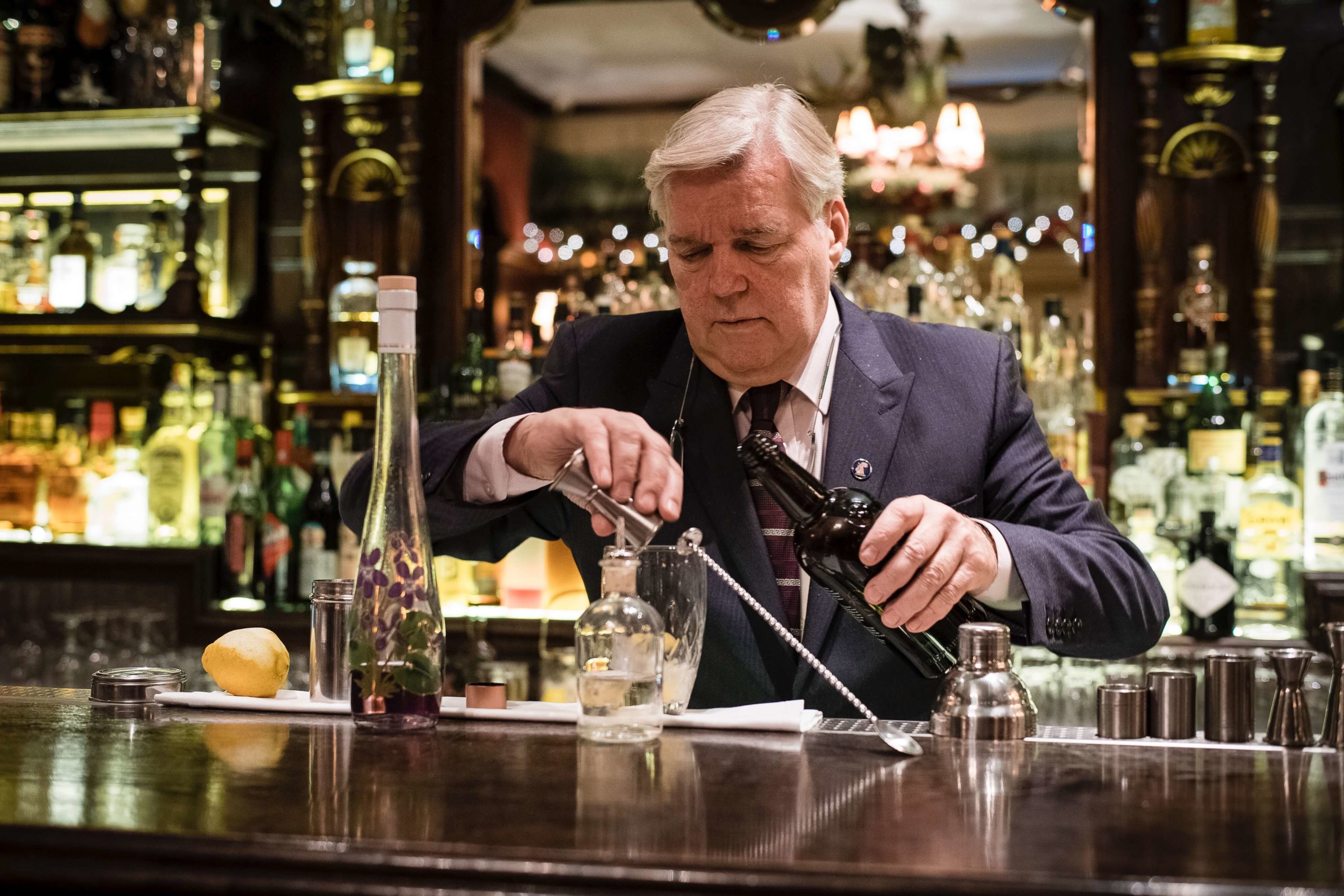Why the secret of a great cocktail is all in the measure, how a 23-second-stir makes the perfect martini, and why he loves the classics.
Established in 1798 by one Thomas Rule, Rules is the oldest, continuously functioning restaurant in London specializing in authentic British cooking and seasonal game dishes. Past clients read as a who’s who of actors (Laurence Olivier, Joan Collins), writers (Evelyn Waugh, Graham Greene) and musicians (David Bowie), and its dining rooms have appeared in smash hits from Bond movies to Downton Abbey. Unapologetically untrendy, it conjures up a world inhabited not so much by celebrity, as by old-school aristocracy, representing the essence of Britishness all wrapped up in one glorious wood-paneled, red velvet, gilded package. But the bar, which opened in 2008, is run by legendary Bostonian transplant, Brian Silva, who is widely agreed by critics as among the best in the world for impeccably made classic cocktails.
What got you into cocktails in the first place?
My first job was at the Colonnade Hotel, Boston in the early eighties. When I poured my first drink, I knew this was what I wanted to do. It was billed as a ‘European Hotel’ and what I loved about it was it had all these interesting ingredients: vermouth, sherries, Aperol, Fernet Branca and good gin. Everything was based around these, which wasn’t the norm in Boston at the time. Fast forward to now, and everybody is drinking vermouth, amaros and aperitifs – the new modern, classics if you like – and I couldn’t run the bar without them.
When and why did you move to London?
I joke with people that I got here in 1989 ‘BC’ – before cranberry juice – when the whole scene was completely different. At that time Britain then was more of a wine drinking country in my opinion, and I was from a cocktail making environment. Interviewing around London I was met with comments like “you don’t have English bar experience,” so I was frustrated. Eventually I interviewed at the IOD on Pall Mall in 1994 with the head bartender, and gave him a sarcastic answer about my experience of English bar service, which he liked. I was hired.
How did you end up at Rules?
In 2008 Ricky McMenemy, the Managing Director at Rules, and owner John Mayhew, had been discussing what Rules needed and decided it was a bar. It was to be located in an upstairs space that had previously been two private dining rooms and Ricky asked me if I’d be interested in taking a look. As soon as I walked through the door, I said “I’ll take it.” It was me all over: clubby, old school, very warm and inviting. They gave me an open hand to do what I thought was right for the bar and I’m very grateful for that.
In 2013 I was offered the opening for the bar at Balthazar in London, for Keith McNally, which I did and loved. When it was sold to Caprice Holdings, it felt too much like a chain and that didn’t work for me. I’d always liked working with Keith because he’s a proper service-led, restauranteur. Rules is the same, they see the whole picture. I returned to Rules in 2018 to open the Winter Garden Room, which gave us over 60 covers and the chance to set the stage for a classic, “Rules style” American bar.
Rules is now one of London’s most emblematic bars. How did you create it?
We have a few rules at Rules. We don’t compete with the restaurant, we enhance it. We don’t serve beer, coffee, or bar snacks, the focus is all on the cocktail. If we need something special I’ll ask the pastry section to make it for us: sugar syrup, champagne syrup and one puree for one cocktail. Everything is very classically old school American, from the way the fruit is cut, to the small mixer bottles we use, to excellent ice.
What is the secret to a great cocktail?
Measure, measure, measure - for me it’s fundamental. Stirred not shaken if it’s just spirits because you control the dilution, which brings balance. I don’t add too many ingredients, because you don’t want to confuse the palate. Three or four ingredients is enough to shine a light on the main ingredient – gin or whisky, say. Be prepared to reverse those ingredients if you want something that’s less ABV. It’s a bit like cooking in that respect - we’re eating lighter and we’re drinking lighter – so my drinks are all about balance. We have absolute process behind every drink and there are strict recipes, which ensures consistency. This has been my ethos forever, so although I have nothing against molecular mixology, it’s just not me. My passion is for the classics.
And what’s the secret of your legendary martini?
It’s stirred, not shaken. I like London dry gins, like Tanqueray or No.3. I’ve always blended our vermouths in house and I use two different brands and mix them half and half. The recipe is six-parts spirit to one-part vermouth. Stir it once and taste so you know where you’re tasting from, then stir for about 10 seconds and taste again. Then finally, and it sounds silly, stir for around 23 seconds depending on the alcohol by volume over plenty of ice in the mixing glass. Serve it club-style, in a frozen glass. At Rules, we use a little frozen beaker and pour it at the table. It’s a bit of showmanship, but it’s also good to keep the drink as cold as possible. For garnish it’s lemons mainly, sometimes olives and the odd onion. I like to spray the cocktail with the zest, but I never wipe it around the rim because all you really get is the bitterness of the lemon.
Do you think it’s ever possible to pair cocktails with food, and if so, with what?
Smoky whisky with smoked salmon works is about as far as I’ll go. But for me, if you’re having a cocktail, and you don’t want to drink wine with your meal, then have a couple more cocktails, why not? It happens a lot more in the US than here, but I think all this business of what to drink with what food, has moved on.
When’s the best time to come for a cocktail at Rules?
I love cocktail hour, because it’s cocktail hour somewhere in the world at all times, right? But let’s call it from 4pm-7pm, unless you’re coming in for lunch, when a Bloody Mary is completely appropriate. The nice thing about drinking cocktails is that there’s a cocktail for every time of the day. There’s a great book about the Stork Club, which opened in New York in1929 and closed in 1964 and the first recipe is for a Manhattan at around 11am. This doesn’t really happen in the States anymore but I still get the call for a serious cocktail over here at lunchtime...thank god!
What do you recommend for Sunday brunch?
People always like a Bellini or a Bucks fizz, but our Bloody Mary is pretty legendary. We serve it in a frozen high ball glass with no ice, and we always peel the celery.
A mid-afternoon pick-me up?
So far as I’m concerned we’re into cocktail hour by then so a Manhattan, an Old Fashioned, or a Vespa. I’m seeing a real trend for whisky cocktails at the moment.
A pre-dinner sharpener?
Definitely a martini. We’re seeing more and more wet ones, which for me is 25ml vermouth to 40ml gin.
What advice have you got for somebody looking to get into cocktails?
Come prepared to be a bar-back and really look after the bartenders. Check the ice, glasses, freezers, fridges, then check again, because one day when all the ingredients and kit are there, we’ll know that person is ready to be put in front of the public and that’s a real thrill. This is one of those trades that you can have in your back pocket for the rest of your life and you’ll never be without work or contacts. You’ll become part of a tight, global community and you can travel the world on it. When someone has been with you for a while, you know when it’s time for them to go, and it’s an amazing thing to see them take flight.
Master Classes at Rules
Brian offers cocktail masterclasses for up to 4 people @ £95 per person. The classes include basic bar techniques, 4 classic cocktails and a couple of bespoke cocktails of their own choosing. Available Wednesdays 2.30 – 4.00pm. Note: classes currently fully booked until July 2022.




